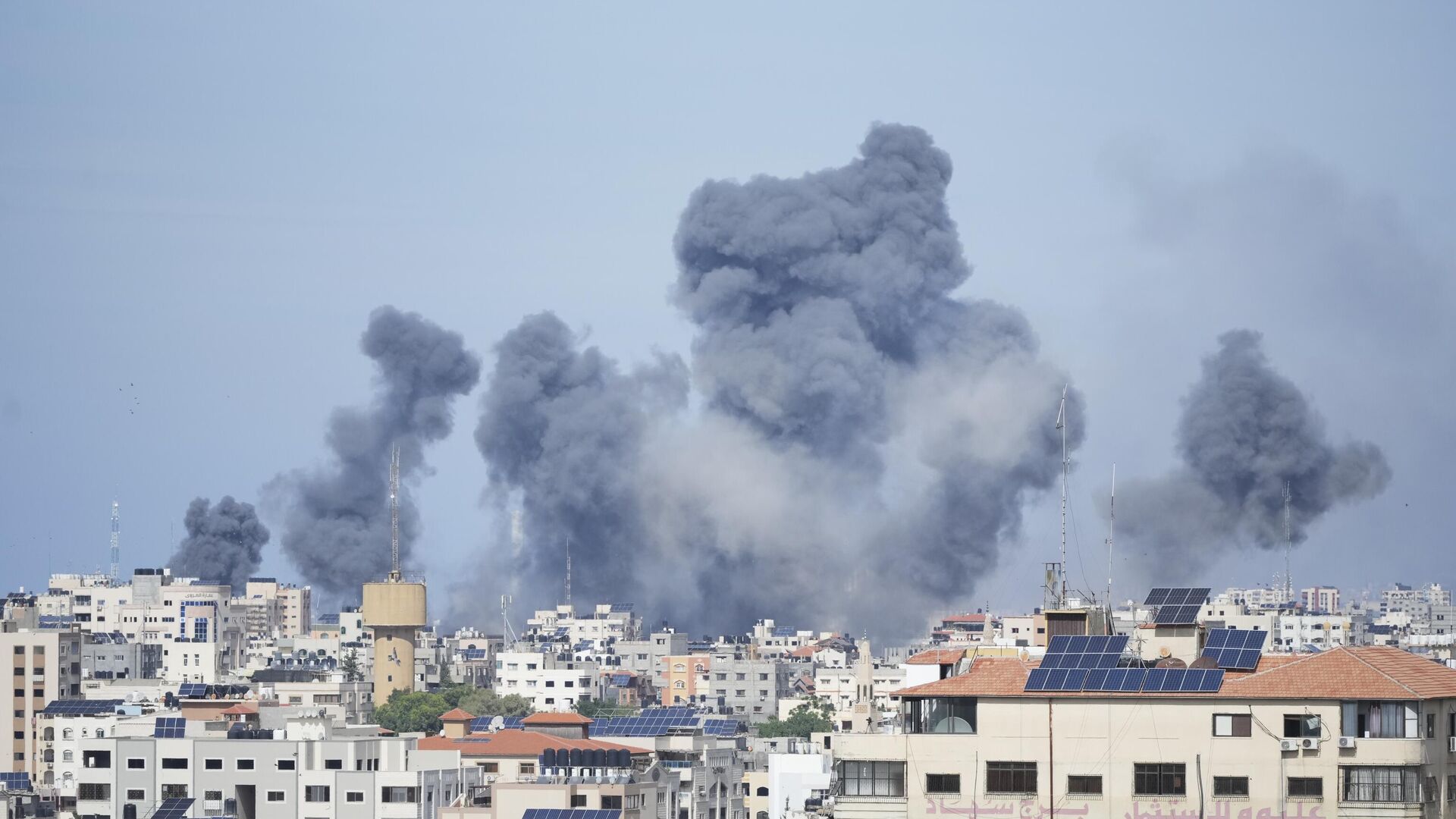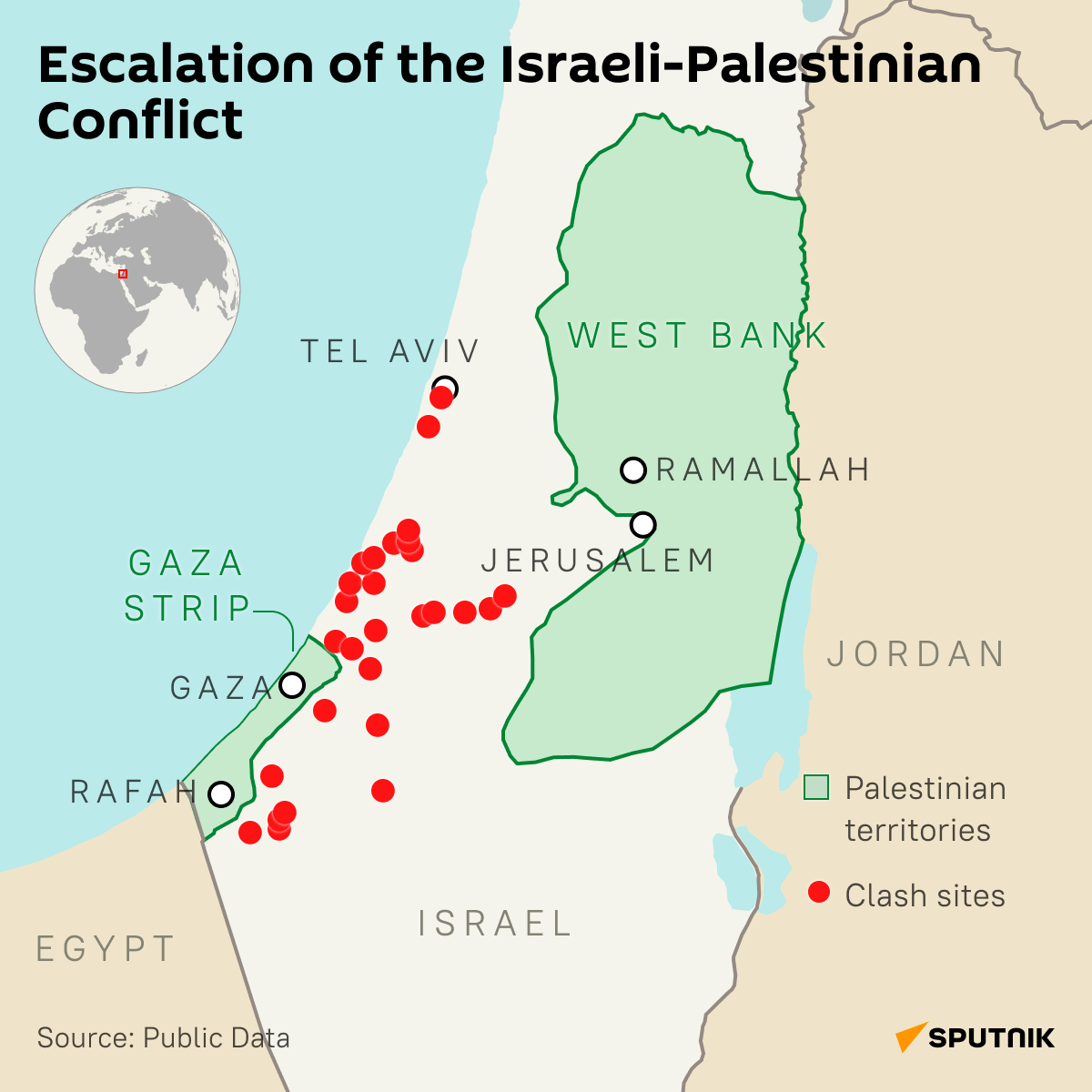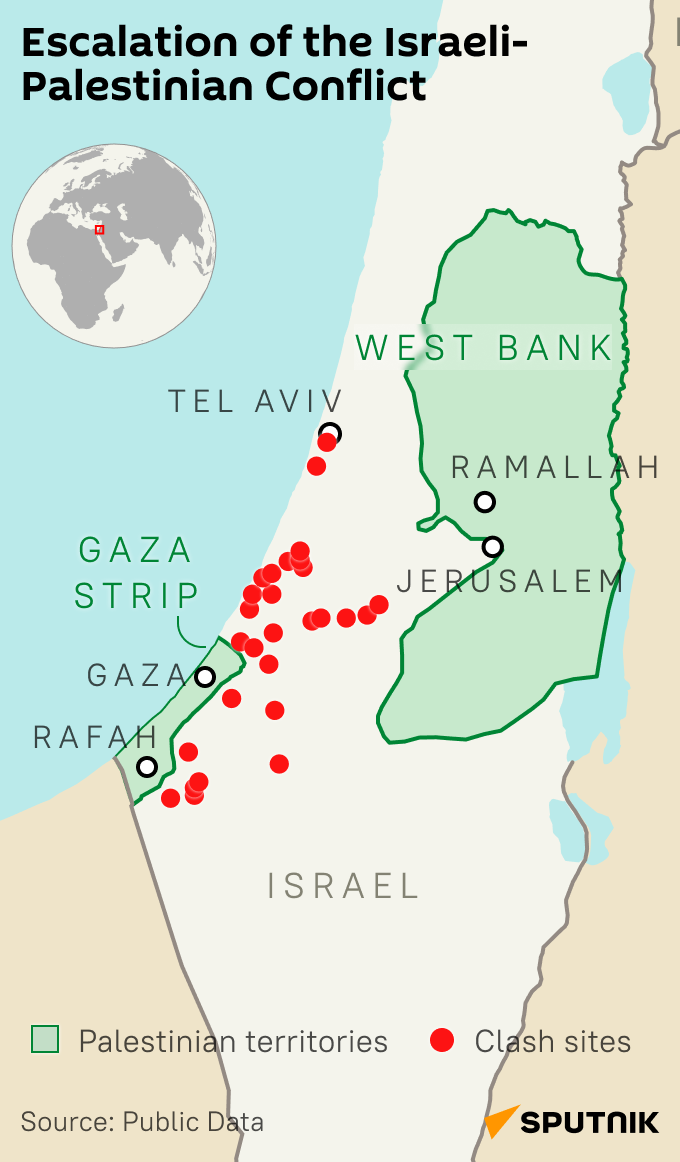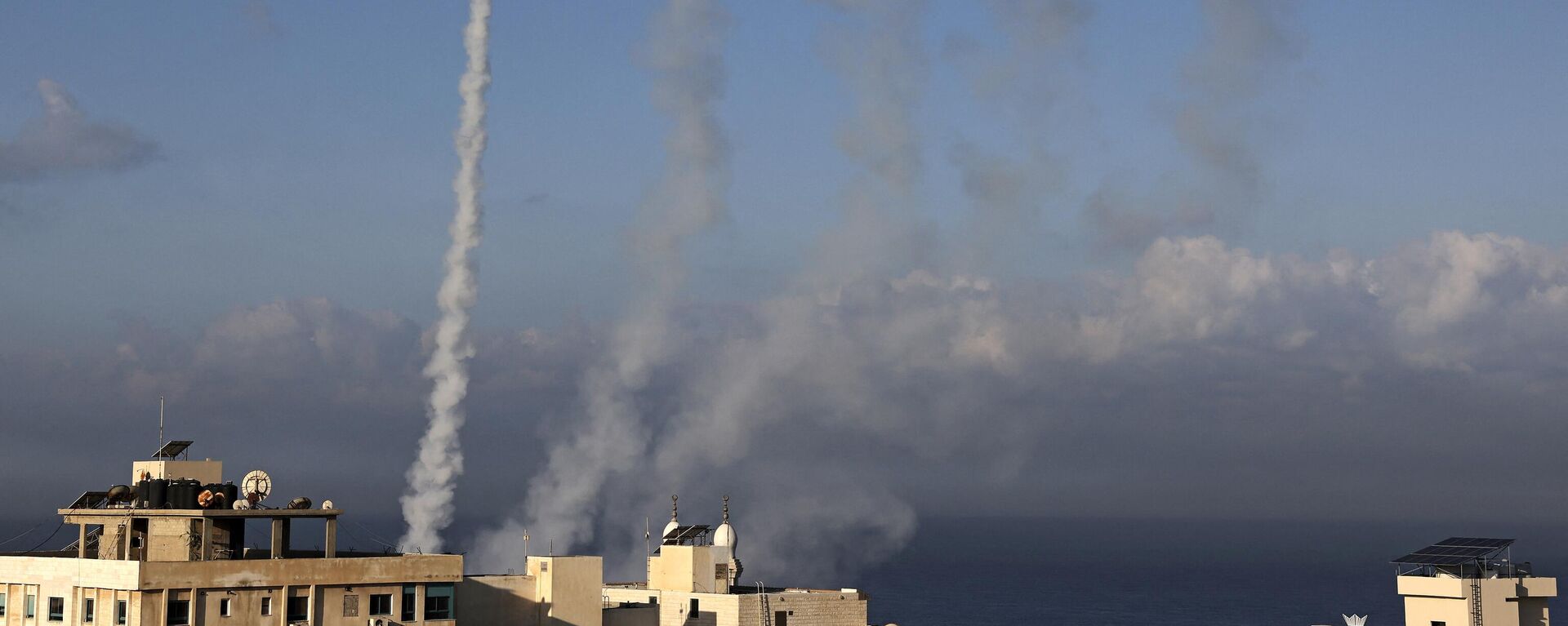'We're in a Huge Mess': Former Israeli Official on Current Gaza Situation
18:54 07.10.2023 (Updated: 16:49 09.10.2023)

© AP Photo / Hatem Moussa
Subscribe
On Saturday morning, Israel was subjected to an extraordinary rocket bombardment from the Gaza Strip. According to the Israeli army, the Palestinian militants fired more than 3,000 rockets, and scores of them invaded southern Israel border regions. Since then, the Israeli force has combed through civilian areas.
The current escalation of the situation between the Palestinian Authority and Israel is a "significant failure" of the existing policy, and will likely result in the change in Jerusalem's stance on the matter, Dr. Kobi Michael, a senior research fellow at the Institute for National Security Studies at Tel Aviv University and former deputy director-general and head of the Palestinian desk at the Ministry for Strategic Affairs, told Sputnik.
"We are in a huge mess, actually. It is a very significant failure, a collapse and an old invalid and irrelevant paradigm. And the price is very high. The numbers of casualties is high. But at the end of the day, things will be changed," he said. "And I think that this might be found as a unique opportunity for Israel and for its allies here in the region to change the existing balance of power on the equation."
According to the expert, Hamas will get out of the current crisis as not "what it used to be before."
"I think that this time Israel will be determined and will dismantle all of its military capacity or at least most of it, and Hamas without its military capacity is almost nothing without almost no political power. And I think that the things must be changed in this regard And unfortunately, it’s too late and with a very high price, I think," the analyst asserted.


In addition, the researcher said that Israel failed to restrain the situation by all means, which will make the country to "pay for this in the part of the doctrine or paradigm strategy."
"We are at war with Hamas at least since 2018, but most recently in the last year and a half. Unfortunately, the Israeli leadership in the last year has failed to contain the situation and to keep calm in any price. And this is the very high price that we are paying for this in our part of the doctrine or paradigm strategy. And unfortunately, as they say, I assume that things will be changed," he noted.
Israeli Prime Minister Benjamin Netanyahu announced on Saturday that the country is in a state of war against Hamas.
Moreover, Michael stressed that one of the causes of the situation is the improvement of Jerusalem's relation with Saudi Arabia, which does not appeal to Iran and Hams.
"I think that there are, I would say two reasons [for the current situation]. I think that the first reason is all the normalization process that we are witnessing with Saudi Arabia. And this is something the Iranians really, really don’t like and Hamas really doesn’t like. And they do all the possible efforts in order to escalate the situation, to destabilize the situation, in order to embarrass the Saudis in order to prevent the Saudis from making any sort of advance in this process," the expert highlighted.
He added that "Palestinians are so cynical and so cruel that they have no problem to initiate the bleeding of their people just in order to stop the process or to put an obstacle in front of the process."
As for the Israeli action, the country conducted airstrikes on the Gaza Strip as footage from social media showed. The 14-story building “Palestine” in the center of the city of Gaza, where the offices of large media channels and companies were located, was reportedly attacked by Jerusalem's Air Force.
Continuing the topic, the researcher underlined that another reason of the conflict aggravation could be that the Hamas considered the current domestic political crisis in Israel as the right conditions for their attack, as the internal problems would distract the country.
"And I think that another reason is a sort of misperception and due to the domestic political crisis in Israel, I think that the Hamas, mainly after they succeeded in blackmailing Israel and Qatar after the last events along the fence, they believe that Israel will not be able to retaliate, is not willing to retaliate, that the Israeli government is pretty occupied with all of its domestic problems. And this is the right moment to launch the final attack. And they believe that they will be able to recruit the other fronts, I will assume that they will not be successful in doing that. And they prepare themselves for a long period of time," Michael emphasized.
Furthermore, the expert is convinced that this attack was not "spontaneous," it was planned, however, due to the poor performance of the Israel's intelligence service "such an extreme thing has happened."
"Everybody understands that such an attack is not a spontaneous thing. This is something that is planned long before. Unfortunately, we were not able to foresee it, to anticipate it. And it’s a failure of our intelligence on the one hand and the risk of operational military failure on the other hand, that such an extreme thing has happened. And they succeeded in penetrating Israeli settlements, kibbutz [traditionally agrarian collective communities in Israel] and the towns to do what they did," the researcher underscored.
However, he is sure that Israel will defeat Hamas and will not accept any mediation or ceasefires.
"Because at the end of the day, Israel will be able to change the situation, to change the reality and to defeat Hamas. And this time Hamas will be treated as, I mean, no mediation or ceasefire until all the military capacities of Hamas would be destroyed, dismantled. And I think that most of its leadership will not be with us in the same future," Michael shared his opinion.
According to the expert, despite previous failures of the country, Jerusalem is determined to "correct the mistakes and change the situation."
"That’s not the first time that’s happened, not only to Israel. I mean, we were surprised several times in the past. Unfortunately, we failed and it was a very significant failure. It’s a very hard thing to say this, because the price is very high, unfortunately. But we are strong enough and we are good enough in order to improve the situation and also to correct the mistakes and to change the situation. And I assume that we are going to do that. And they assume that Hamas is going to pay a very, very high price," the researcher said.
Commenting on the possibility to hold talks with Hamas, Michael excluded this outcome, while calling Hamas "barbarians, jihadists, radical extremists."
"There is no place for negotiating. There is no other place to work to deal with them, but also to defeat them. And I think this time this will be the outcome. If somebody is disillusioned to think we are able to negotiate or Hamas is able to compromise to be pragmatic consensus, then, I think, that everybody understands now that it is a mistake and there is no such a possibility," he claimed.
Speaking about the 3,000 missiles sent by Hamas, the expert highlighted that most of them fell in an open area, noting that the Iron Dome system intercepts only those rockets that will presumably hit the populated areas.
"We don’t have to be too impressed from the very high numbers. We are talking about almost 3000 missiles, rockets, but most of them actually hit nothing. We have to understand that the Iron Dome is a very sophisticated system. And it intercepts only rockets that the system finds as rockets that are going to fall on populated areas. And if the system thinks that the rocket is going to fall in an open area, then there is no interception. There is no use to intercept it. And the percentage of success is very high, more than 95%," the researcher underlined.
As for the number of casualties, Michael explained that there were not so many victims because the citizens "are very well-trained in this regard."
"But when they launch dozens of rockets, some of them will not be intercepted, unfortunately. [...] But the Israeli population is very well-trained in this regard. The reason that we have almost no casualties, because we have the shelters and the public is very disciplined and our home front command is very well occupied and trained. Therefore, the instructions for the population are very clear. And the casualties from the rockets are very minor," he stressed.
According to recent data, the death toll after the shelling of Israel from Gaza reached 100, more than 900 people were injured. Meanwhile, the number of people injured in Palestine exceeded 1,600 and about 198 people were killed, the Palestinian health ministry reported.
However, according to the expert, the casualties are "very severe not because of the rockets," but because of "the penetration of the Israeli settlements and the idea that they were able to slaughter people."
Furthermore, he underlined that for Hamas it "is historically a turning point," because "after this war" it will no longer be what it used to be.
"We are in the war, and in the war we are going to decide. We are not going to contain or are not going to try to negotiate and to reach to some understandings and to reestablish the calm, as in the years from 2009. Now, this Israel is going to decide Hamas means. Hamas means to target its leadership as to went on to destroy its capacities. Unfortunately, the people of Gaza are going to pay a very heavy price," the expert emphasized.
In conclusion, the researcher reiterated that the Gaza population will "pay a very heavy price," adding that "this might be an opportunity for the region to reshape the regional architecture."
As for the Palestinian position on the matter, Palestinian President Mahmoud Abbas highlighted the right of the Palestinian people to protect themselves against Israeli troops and settlers and ordered the officials to do whatever is necessary to strengthen the resilience of the Gaza Strip residents.
This was echoed by the Palestinian Minister of Social Development, Ahmed Majdalani, who noted that the deterioration of the situation in Gaza Strip is the "the result of a political impasse," adding that the Palestinian people "have a legitimate right to defend themselves and resist the occupation."


